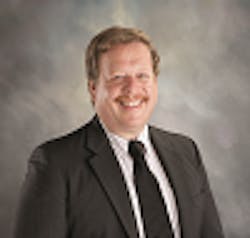Just like former office workers everywhere, many of us at Control and Putman Media have been scaling down and consolidating our former spaces because we aren't there as often, and aren't likely to be there much more often in the future. In my case, I weeded and shrunk my former cubicle down to a few boxes of archived issues in a closet. This forced me to get rid of the equivalent of a 10-foot stack of 8.5 x 11 in. pads and reporter notebooks that I'd been accumulating over the past 15 years.
I can argue that I keep the magazines and notes for future references, but I admit I'm no doubt trying to hang onto something solid in a field that's more ephemeral that it appears. Printed text can seem like it's written in stone. However, it's not, and this is even more true when it's presented online.
Anyway, going though all my notes reminded me of all the people I've interviewed and written stories about over the years. As I often explain to contacts, I'm not an engineer like many of our authors and columnists, so I have to find experts, who can talk about the topics Control covers every month. While many prospective sources still decline to be interviewed, literally thousands of engineers, end users, system integrators, suppliers and other experts have generously taken the time to share their experiences, lessons learned and best practices with me and our readers. I'm always glad to find some enlightening and encouraging words from people who are further along the learning curve, but I'm especially appreciative because it makes my job possible.
Amazingly, some sources even let me bug them with repeated interviews, and I'm even more grateful to them. After awhile, a few become more like my fellow editors and art directors, who flawlessly put Control's useful content into a package that's consistent, approachable, and even enjoyable to consume and experience.
However, all this reminiscing also reminded me about a core principle of reporting and editing that I realized very early on. In one of the first stories I ever wrote, I talked to an official at Carleton College about its newly installed, springy, artificial-surface track, and he asked offhand if I'd be able to write a good story. I don't know where my response came from, but I'm proud that I immediately answered that I was just a conduit for what he had to say, and that any publication is just a big dinner table, where everyone in the family or group can share what they "learned in school" or at work that day. After more than 35 years, I can confirm that my initial belief in reporting as a conduit—an editorial flowmeter perhaps—between community members has been true throughout my entire experience.
In addition, while I'm no expert on technical details, my accumulated reporting and memory have allowed me to observe some deeper, more meaningful trends as time has passed in the community and industries I've covered. Chiefly, I've seen industrial networking evolve from hardwiring and fieldbuses to Ethernet and wireless. I've also witnessed how microprocessors and software continue to inexorably replace hardware and manual functions everywhere, as well as all the fits, starts, wrinkles, financial drains and other trauma along the way. These aren't exactly revelations, but they do provide some context that makes it easier to cover most stories.
The good news is the Internet and digitalization make many jobs easier, including mine. The difficult news is anyone can do it, and so everyone can be conduit for everyone else in their groups.
Luckily, just as the big data deluge can be overwhelming, I think that I can still be useful by employing editorial's second core principle—editing, prioritizing, cutting through the blather, and providing the few nuggets that are most likely to be useful to others in my community.
This process begins with getting immersed in each assigned coverage area and its disciplines, thinking carefully, and formulating better questions to encourage better answers. I'm no expert at this either, so I'm still practicing how to listen and pay attention.



